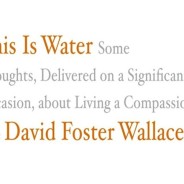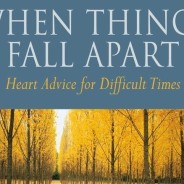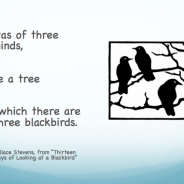Posted by Diane Morrow on July 26, 2015 in Blog, Perspective, Writing and Healing Prompts

I’m thinking of this speech by David Foster Wallace because I’m reading his book, Infinite Jest, this summer, and will be showing the speech again this fall to my students, and because the speech connects so well to the poem by Alison Luterman that I wrote about back in April—Because Even the Word Obstacle Is an Obstacle. The whole speech is well worth listening to and I’m embedding it here. I’m also excerpting a short piece from his speech that connects especially well to the poem. There are so many pieces I could excerpt. But, for now, this one, in which he muses on how a person might consider navigating the ordinary experience of going to the grocery store differently: But most days, if you’re aware enough to give yourself a choice, you can choose to look differently at this fat, dead-eyed, over-made-up lady who just screamed at her kid in the checkout line. Maybe she’s not usually like this. Maybe she’s been up three straight nights holding the hand of a husband who is dying of bone cancer. Or maybe this very lady is the low-wage clerk at the motor vehicle department, who just yesterday helped your spouse resolve a horrific, infuriating, red-tape problem through some small act of bureaucratic kindness. Of course, none of this is likely, but it’s also not impossible. It just depends what you want to consider. If you’re automatically sure that you know what reality is, and you are operating on your default setting, then you, like me, probably won’t consider possibilities that aren’t annoying and miserable. But if you really learn how to pay attention, then you will know there are other options. It will actually be within your power to experience a crowded, hot, slow, consumer-hell type situation as not only meaningful, but sacred, on fire with the same force that made the stars: love, fellowship, the mystical oneness of all things deep down. How well that connects to Alison Luterman’s last stanza: So your moment of impatience must bow in service to a larger story, because if something is in your way it is going your way, the way of all beings; towards darkness, towards light. I feel like there’s a writing idea in here somewhere. Catching a moment of impatience and spinning it. Catching a moment when the water is not as smooth as we would like. And then imagining the story forward. What if the woman in the grocery store is not who I think she is? What if appearances are entirely deceptive? What if the boy in the next lane learning to hold his breath is practicing to save his life? Or—who knows?—what if he’s practicing to save mine? What if we could begin by imagining just one thing that is not what it appears to be? And then writing about that. See also Alison Luterman’s poem: Because Even the Word Obstacle is an...
read more




